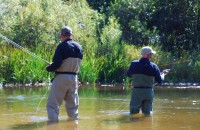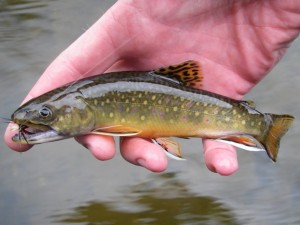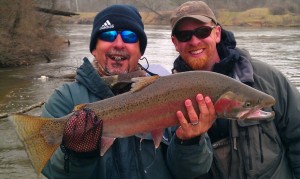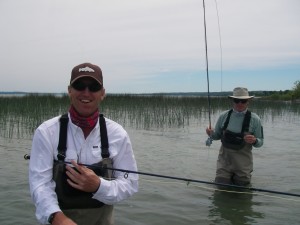 Chances are if you are reading this, you already like to fly fish. If that’s the case – why not share it with someone new to the sport – a kid, a friend or family member? Below you will find reasons to introduce others, how to avoid intimidation and resources to help you along the way.
Chances are if you are reading this, you already like to fly fish. If that’s the case – why not share it with someone new to the sport – a kid, a friend or family member? Below you will find reasons to introduce others, how to avoid intimidation and resources to help you along the way.
Reasons
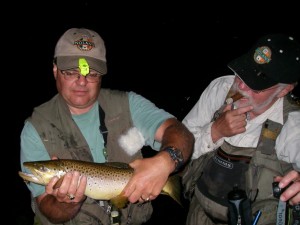 There are plenty of reasons why introducing someone to fly fishing is advantageous – here are some which might apply to you:
There are plenty of reasons why introducing someone to fly fishing is advantageous – here are some which might apply to you:
- It’s often nice to share the time with someone else, especially the drive to and from the water. Besides, having a friend to net the that big fish and take a picture is easier than by yourself.
- Safety in numbers – what if something happens and you’re alone? Having a friend nearby can prove real smart.
- Get someone involved who will get you on the water more. A good example is a friend who got his father-in-
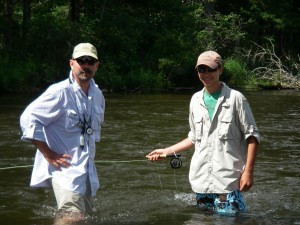 law into the sport. The amount of time he spent
law into the sport. The amount of time he spent
fishing increased significantly — plus, he had his wife’s
support and approval. - By getting your kids out, not only will you get to spend some good time with them outdoors, but it will get you on the water more and with mom’s blessing.
- Share the sport and promote conservation. We need all the help we can get with preserving and improving our fisheries – one more license bought and a future voice to speak will only help.
- Pass the sport on to a kid. There are plenty of activities competing for kids attention today, and it seems like the majority of them take place indoors. Get a kid outside and mentor them – they are the future of fly fishing. Big Brothers & Big Sisters, the neighbor kid, a nephew or other relative are possible candidates – have an impact.
Avoid Intimidation
Thinking back to when I first started this sport without a mentor, I was intimidated by all there was to know and didn’t know where to begin. Eliminate that feeling for a beginner by coaching them on the necessary basics and keeping it fun. Here are some thoughts on how to achieve this:
- Let them use some of your equipment at first to see if they like the sport before they buy. This eliminates the costs associated and allows them to try the sport first.
- Start them off with a casting lesson on the lawn or on a pond without the intimidation of flies/hooks, moving water, picky fish, etc. This reinforces the fundamentals of fly fishing – casting and once grasped, it makes it
easier to fish. - When I first started off, a good day of fishing was measured by not catching trees or tag alders along the bank. Any caught fish were an extreme bonus. Don’t hold them to your own fishing expectations – you probably are much better at the sport than they are. Instead, help make realistic goals and encourage them. Don’t snicker at a tangled leader or the small brook trout they caught.
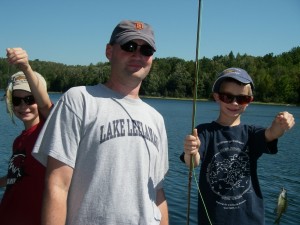
- Pick the season and species. Bluegill fishing on ponds and lakes is a great way to learn the sport. There are often plenty of fish that eat aggressively, providing opportunities on how to set the hook and bring a fish to hand. The basics are still required: casting, line control, fly manipulation, reeling, knots, etc. Consider that there are many more places to fish panfish than there are trout rivers.
- If trout fishing, determine an ideal time to get out there. Opening day or late evening spinner falls for selectively feeding fish aren’t necessarily ideal for someone starting out. Fish when there is daylight so they can see what they are doing and can feel comfortable as they learn how to wade.
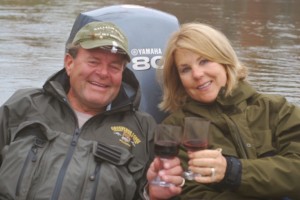 If you’re thinking about getting your wife or girlfriend involved, proceed with caution. Based on observation, I think it’s sometimes best to let someone else help with this task rather than test the strength of your relationship. This is where a guide’s fee can be priceless.
If you’re thinking about getting your wife or girlfriend involved, proceed with caution. Based on observation, I think it’s sometimes best to let someone else help with this task rather than test the strength of your relationship. This is where a guide’s fee can be priceless.- Keep the amount of time realistic. Don’t push the sport and when they are frustrated, offer a hand and encouragement rather than a chuckle. Be patient – they might just pick up the tab at the tavern on the way home.
Resources
Here are some suggestions on resources to help you, the mentor get the newbie started and off in the right direction:
- Get them a casting lesson to get started without teaching them any of your bad habits. Hiring a professional will streamline the process.
- Hire a guide for a half-day instead of a full-day to flatten the learning curve and keep it fun. As an FFF certified casting instructor and a guide, I have an appreciation for having fun while keeping the learning on track and often into fish without overwhelming them. Make their first experiences with the sport positive.
Selfish and shamelss promotion: hiring a guide will help
make it that way.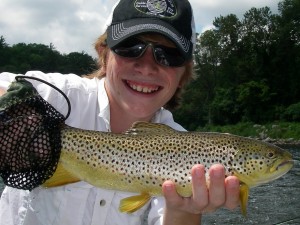
- The Traverse City based Adams Chapter of Trout Unlimited offers two unique programs for kids. The “First Cast” program takes place in the summer one night a week for appx. 5 weeks. The Adams Chapter also works with The Kalamazoo Valley Chapter of TU and sponsors kids to attend a four day camp for young adults to learn about fly fishing. Check the Adams Chapter website for more information on these programs.
- There are ideal books and DVDs for someone starting out, including “First Cast to First Fish” by Joseph Petralia, “Fly Fishing Made Easy” by DVD from Scientific Anglers and “The Little Red Fishing Knot Book” by Harry Nilsson.
- For kids, consider “First Cast: Teaching Kids to Fly Fish” by Phil Genova and “Fly Fishing with Children” by Philip Brunquell.

